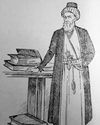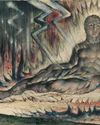Prøve GULL - Gratis
Irish Philosophy & Me
Philosophy Now
|February/March 2024
Cathy Barry charts her journey through historical Irish thought.

Some claim Britain as the origin-point of the Enlightenment. France and Germany are equally famous for their philosophy. But what about Ireland? Those particularly interested in philosophy may have heard of John Scotus Eriugena and George Berkeley, but probably no more than that. Ireland has not been seen as a philosophical place.
In 2013 I was dabbling in blogging. Just before St Patrick’s Day (17th March), I saw Berkeley and Irish Philosophy on a library shelf, and decided to post about Berkeley, the single isolated genius I expected to find in that book. I had no idea what I was getting myself into. I wasn’t expecting, for example, William Molyneux promoting Enlightenment thought in late seventeenth century Dublin. A correspondent with John Locke, Molyneux set up an Irish philosophical society on the lines of Britain’s Royal Society, and convinced the provost of Trinity College Dublin to add Locke’s Essay Concerning Human Understanding to the syllabus.
As for John Toland, he was a shock to everyone. Born into an Irish-speaking Catholic family in Donegal, he left all that behind and became an advocate of ‘rational religion’ (that is, of deism), as he expounded in Christianity Not Mysterious (1696). The book, which argued that true religion includes no mysteries, caused a furore in both England and Ireland. When Toland arrived in Dublin in 1697 he found himself denounced from the pulpit. A few, including Molyneux, welcomed him, but after months of arguing in taverns and coffee shops, he left just before the Irish Parliament ordered his book banned and burned by the public hangman. Never to return to Ireland, Toland was later an editor of republican writings, a political philosopher supporting the Whigs, a pamphleteer for various political figures, and a hanger-on at the court of Sophia of Hanover.
Denne historien er fra February/March 2024-utgaven av Philosophy Now.
Abonner på Magzter GOLD for å få tilgang til tusenvis av kuraterte premiumhistorier og over 9000 magasiner og aviser.
Allerede abonnent? Logg på
FLERE HISTORIER FRA Philosophy Now

Philosophy Now
Bilbo Theorizes About Wellbeing
Eric Comerford overhears Bilbo and Gandalf discussing happiness.
9 mins
December 2025 / January 2026

Philosophy Now
What Women?
Marcia Yudkin remembers almost choking at Cornell
11 mins
December 2025 / January 2026

Philosophy Now
Islamic Philosophers On Tyranny
Amir Ali Maleki looks at tyranny from an Islamic perspective.
4 mins
December 2025 / January 2026

Philosophy Now
Peter Singer
The controversial Australian philosopher defends the right to choose to die on utilitarian grounds
5 mins
December 2025 / January 2026

Philosophy Now
Another Conversation with Martin Heidegger?
Raymond Tallis talks about communication problems.
7 mins
December 2025 / January 2026

Philosophy Now
Letters
When inspiration strikes, don't bottle it up. Email me at rick.lewis@philosophynow.org Keep them short and keep them coming!
17 mins
December 2025 / January 2026

Philosophy Now
The Philosophy of William Blake
Mark Vernon looks at the imaginative thinking of an imaginative artist.
9 mins
December 2025 / January 2026

Philosophy Now
Philosophical Haiku
Peering through life’s lens God in nature is deduced: The joy of being.
1 mins
December 2025 / January 2026

Philosophy Now
Philosophy Shorts
More songs about Buildings and Food' was the title of a 1978 album by the rock band Talking Heads. It was about all the things rock stars normally don't sing about. Pop songs are usually about variations on the theme of love; tracks like Rose Royce's 1976 hit 'Car Wash' are the exception. Philosophers, likewise, tend to have a narrow focus on epistemology, metaphysics and trifles like the meaning of life. But occasionally great minds stray from their turf and write about other matters, for example buildings (Martin Heidegger), food (Hobbes), tomato juice (Robert Nozick), and the weather (Lucretius and Aristotle). This series of Shorts is about these unfamiliar themes; about the things philosophers also write about.
2 mins
December 2025 / January 2026

Philosophy Now
Hedonic Treadmills in the Vale of Tears
Michael Gracey looks at how philosophers have pursued happiness.
8 mins
December 2025 / January 2026
Listen
Translate
Change font size
